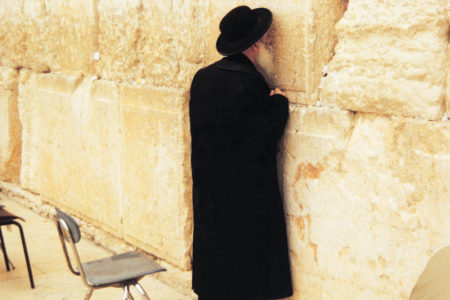God Is Holy (Theology Proper)
What is the holiness of God? For many years I thought the sum total of God’s holiness was His sinlessness. But I was mistaken. God’s sinlessness is an important aspect of God’s holiness, but it is only one aspect. God’s holiness involves far more than sinlessness.
The Meaning of the Holiness of God
The Meaning of Holy. The root of the word translated “holy” means “to divide.”1 A holy person is divided from other persons and things by being different, distinct, or even unique from them.
The Bible’s opposite of holy is profane. To be profane is to be “common” or “ordinary.”2 Thus to be holy means to be different, distinct, or unique from the common or ordinary.
Biblical Examples. God rebuked Israel’s priests for profaning His holy things and making no distinction between the holy and profane (Ezek. 22:26). They converted into common or ordinary the things He wanted kept different or distinct.
God declared the Sabbath holy for Israel under the Law (Ex. 31:14–15). The seventh day of the week was to be different, distinct, or unique. The Israelites were to work on the other six days, which were common and ordinary. But they were to rest on the Sabbath.
The Bible is called “the holy Scriptures” (literally, “the holy writings,” Rom. 1:2; 2 Tim. 3:15).3 This designation means the Bible is different, distinct, or unique from all other writings. The Bible is inspired by God (2 Tim. 3:16). That fact is not true of any other writings.
Holiness As Ascribed to God. When the Bible declares that God is holy, it means that God is different, distinct, or unique from everyone and everything else. Some ascriptions of holiness to God demonstrate this.
When Moses and the people of Israel sang a great song of praise to God after He delivered them safely through the Red Sea, they said, “Who is like unto thee, O LORD, among the gods? Who is like thee, glorious in holiness . . .?” (Ex. 15:11). They associated God’s holiness with the fact that He is different, distinct, or unique from all other gods mankind worshiped. They emphasized that no one else is as distinctive or unique as He.
Hannah, Samuel’s mother, declared, “There is none holy like the LORD, for there is none beside thee, neither is there any rock like our God” (1 Sam. 2:2). She equated God’s holiness with His uniqueness.
In the midst of a passage (Isa. 40:12–31) that emphasizes the unparalleled greatness of God, God asked, “To whom, then, will ye liken me, or shall I be equal? saith the Holy One” (v. 25). God indicated that His holiness is synonymous with His uniqueness. No one else matches Him.
God’s declaration, “I am God, and not man, the Holy One in the midst of thee” (Hos. 11:9), signified that His holiness involves His being different or distinct from mankind.
Thus the holiness of God is His quality of being divided from everyone and everything else by being different, distinct, or unique from them.
The Basic Attribute of God
At least two factors indicate that holiness is God’s basic, foundational attribute. First, other attributes contribute to His holiness. God is omnipresent (everywhere present), omniscient (knows everything), omnipotent (all powerful), infinite (no limitations), self-existent (not dependent on anyone or anything else for His existence), and eternal (no beginning or end). No one but God possesses these attributes. Therefore, these attributes contribute to His uniqueness.
Second, the four angels around God’s throne in heaven incessantly cry out, “Holy, holy, holy, Lord God Almighty” (Rev. 4:8). The fact that they continuously emphasize God’s uniqueness as they surround His special presence in heaven seems to indicate that God’s uniqueness means more to Him than any other attribute. His holiness is absolutely essential to who He is.
Manifestations of God’s Holiness
When Sennacherib, King of Assyria, threatened Jerusalem with his great army during King Hezekiah’s reign, he asserted that, just as the gods of other nations could not deliver those nations from his strong hand, so would Jehovah be unable to rescue Jerusalem from Assyria’s military might (2 Ki. 18:28–35; 19:8–13). Sennacherib insinuated that Jehovah, the God of Israel, was no different from the gods of other nations. Thus he verbally attacked the uniqueness or holiness of God.
King Hezekiah recognized Sennacherib’s statements to be a reproach against God (2 Ki. 19:3–4, 16) and an attack on His uniqueness. Therefore, He said to Jehovah, “thou art the God, even thou alone, of all the kingdoms of the earth” (v. 15); and he asked God to save Jerusalem from the Assyrian king so “all the kingdoms of the earth may know that thou art the LORD God, even thou only” (v. 19).
God declared that He would judge Sennacherib and defend and save Jerusalem (2 Ki. 19:6–7, 20–34). He addressed Sennacherib as follows: “Whom hast thou reproached and blasphemed? And against whom hast thou exalted thy voice, and lifted up thine eyes on high? Even against the Holy One of Israel” (v. 22). God thereby warned this arrogant king that he had reproached the God who is different or unique from all other gods.
God then supernaturally killed 185,000 Assyrian soldiers in one night (2 Ki. 19:35), breaking the back of Sennacherib’s army. The Assyrian retreated home and was assassinated (2 Ki. 19:36–37). Jehovah, the God of Israel, graphically demonstrated that He was not impotent against Assyria’s might, as the gods of other nations had been.
A second manifestation of God’s holiness is recorded in Isaiah 6:1–4. Isaiah saw God seated on His throne. Seraphim (angels of high rank) stood above the throne, crying out, “Holy, holy, holy, is the LORD of hosts; the whole earth is full of his glory” (v. 3). These exalted beings emphasized God’s holiness.
This emphasis is significant in light of the seraphim’s position above God’s throne. Originally, another exalted angel had occupied that position: Lucifer, the anointed cherub who covered God’s throne (Isa. 14:12; Ezek. 28:14, 16). But Lucifer became consumed with pride because of his exalted nature (Ezek. 28:15, 17; 1 Tim. 3:6) and boasted that he would “be like the Most High” (Isa. 14:14). This assertion that he could become like God was an attack on God’s uniqueness.
Because of this reproach against His uniqueness, God cast Lucifer out of His heaven (Isa. 14:12; Ezek. 28:16) and apparently replaced him with the seraphim above His throne. The word translated “seraphim” means “burn,” and its root means “fire.”4 The term may indicate that the seraphim looked fiery to Isaiah or that, contrary to Lucifer, they emphasized God’s holiness because they burned with zeal for His uniqueness.
As Isaiah observed this great emphasis on God’s holiness, he became overwhelmed by a sense of his sinfulness and that of his people (Isa. 6:5). Apparently, one particular aspect of God’s holiness impressed Isaiah on this occasion—the difference between God and mankind in relationship to sin. Mankind is sinful, but God is absolutely sinless (1 Jn. 1:5–10).
The Holiness of Places Where God Is Uniquely Present
Although God is everywhere at the same time, the Bible teaches that places where God is present in a unique sense or makes His presence uniquely known are holy. Thus Scripture declares that heaven (Dt. 26:15; Isa. 57:15; Jer. 25:30), God’s throne (Ps. 47:7–8), the Tabernacle and its furnishings (Ex. 40:9, 34–35), the Temple (1 Chr. 29:3; Ps. 5:7), the land of Israel (Zech. 2:12), Jerusalem (Neh. 11:1; Mt. 4:5), Mount Zion (Ps. 2:6), the Mount of Transfiguration (2 Pet. 1:18), and the church (1 Cor. 3:16–17; Eph. 2:19–22) are holy. Because God is present in a unique sense at each of these places, they are different, distinct, or unique from other places. Other places are common or ordinary in contrast with them.
The Holiness of Persons and Things God Owns
The Bible also teaches that whatever God owns is holy. It declares that God’s covenant with Abraham (Lk. 1:72–73), His people Israel (Ex. 19:5–6; Dt. 7:6), His Old Testament prophets (Lk. 1:70; Acts 3:21; 2 Pet. 3:2), His New Testament apostles and prophets (Eph. 3:5), His arm (power, Ps. 98:1; Isa. 52:9–10; 63:12), His Messiah (Ps. 16:10; Isa. 10:17), His words (Jer. 23:9), His name (Lev. 20:3; 22:2, 32; Ps. 111:9; Ezek. 36:20–23; 43:8; Lk. 1:49), and His church (Eph. 5:27–29; 1 Pet. 2:9–10) are holy. Because God owns these persons and things, they are different, distinct, or unique from other persons and things. Others are common or ordinary in contrast with them.
The Application of God’s Holiness
The Bible sometimes applies God’s holiness to His people.
Position. First, it declares that believers are holy. Peter called believers “an holy nation” (1 Pet. 2:9), and Paul called them “saints” (1 Cor. 1:2; Eph. 1:1; Phil. 1:1; Col. 1:2). The term saints means “holy ones.”5
The declaration that believers are holy means that God has given them a different, distinct, or unique position. Since man’s fall, all human beings (except Jesus Christ) have been born in a sinful, unsaved condition with membership in Satan’s kingdom (Ps. 51:5; Eph. 2:1–3; 1 Jn. 3:10). Since this condition is true of all human beings, it constitutes what is common or ordinary. But when a person trusts Jesus Christ to be his personal Savior from sin, God divides him spiritually from the realm of the unsaved and places him in the realm of the saved; God separates him from membership in Satan’s kingdom and gives him a position in His family and Kingdom (Eph. 2; 5:8; Col. 1:13; 1 Pet. 2:9–10). In other words, God gives the believer a position that is different, distinct, or unique from the common, ordinary position of the unsaved.
The basis for the holy position of believers is twofold. (1) They are indwelt by God (“your body is the temple of the Holy Spirit who is in you,” 1 Cor. 6:19); and (2) they are owned by God (“ye are not your own…For ye are bought with a price,” 1 Cor. 6:19–20). Places where God is uniquely present are holy, and everything God owns is holy.
Practice. Second, believers are commanded to be holy (1 Pet. 1:14–16). This command relates to a different application of God’s holiness than the holy position believers receive at the moment of salvation. This command to be holy relates to the believer’s world-life view, values, character, lifestyle, and practice. Since God is holy, He expects the members of His family and Kingdom to have world-life views, values, characters, lifestyles, and practices that are different, distinct, or unique from those of the unsaved.
Proclamation. Third, God’s people are commanded to “worship the LORD in the beauty of holiness” (Ps. 29:2). The word translated “beauty” means “adornment.”6 In private and public worship, believers are to adorn God with His holiness by declaring how different, distinct, or unique He is in contrast with everyone and everything else.
ENDNOTES
- Otto Procksch, “hagios,” Theological Dictionary of the New Testament, I, Eerdmans, Grand Rapids, 1964, p. 89.
- Ibid.
- “Graphe,” A Greek-English Lexicon of the New Testament, 4th rev., ed. William F. Arndt and F. Wilbur Gingrich., University of Chicago Press, Chicago, 1957, p. 165.
- Laird Harris, “Sarap,”Theological Word book of the Old Testament, Vol. II, Moody Press, Chicago, 1980, p. 884.
- “Hagioi,” A Greek-English Lexicon of the New Testament, 4th rev., ed. William F. Arndt and F. Wilbur Gingrich., University of Chicago Press, Chicago, 1957, p. 10.
- “Hadarah,” A Hebrew and English Lexicon of the Old Testament, ed. Francis Brown, S.R. Driver, and Charles A. Briggs, Clarendon Press, Oxford, 1975, p. 214.






